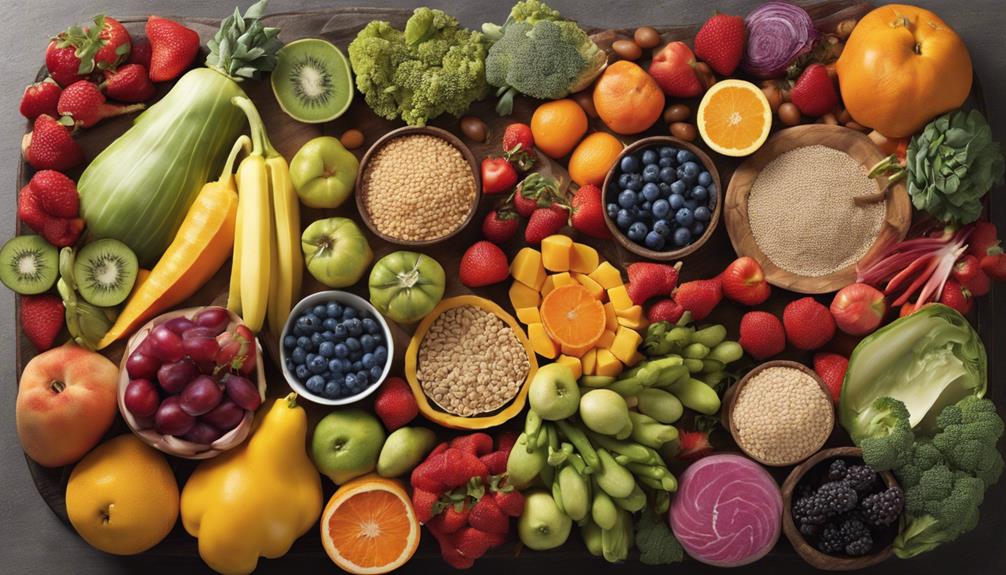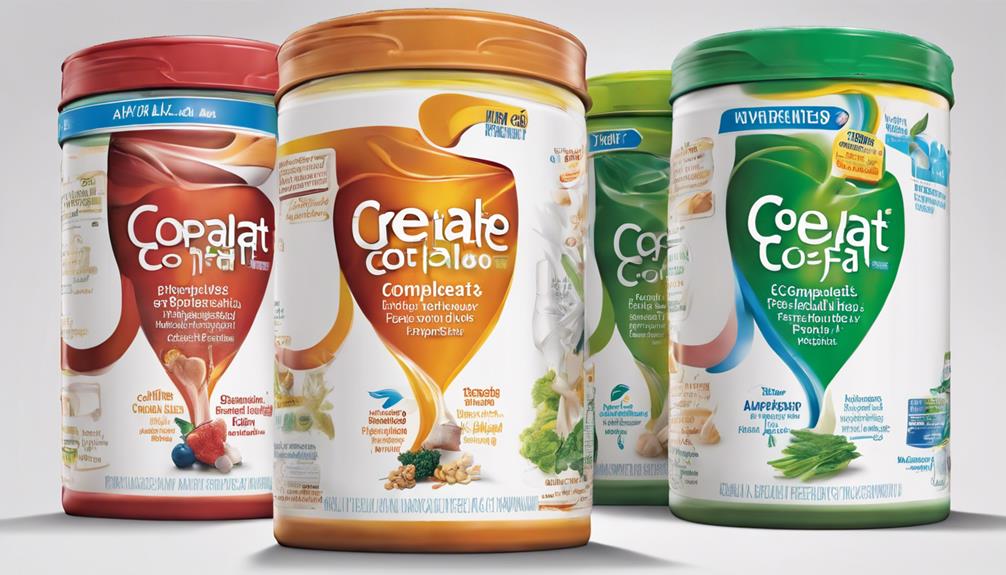As we explore the topic of the best diet for breastfeeding, it's fascinating to note that breastfeeding mothers require an additional 330 to 400 calories per day to meet their nutritional needs.
But what exactly should these extra calories consist of, and how do they impact both mother and baby?
Let's uncover the intricacies of maintaining a well-balanced diet while breastfeeding, and discover the key elements that contribute to ideal health for both mom and little one.
Key Takeaways
- Proper nutrition is essential for both mother and baby health during breastfeeding.
- Include galactagogues, protein-rich foods, leafy greens, and healthy fats for optimal milk production.
- Stay hydrated with water, herbal teas, and lactation support foods to support milk supply.
- Consume additional calcium, iron, omega-3 fatty acids, vitamin D, and protein for overall well-being while breastfeeding.
Importance of Nutrition for Breastfeeding
Ensuring proper nutrition during breastfeeding is essential for both the mother's health and the baby's growth and development. Breast milk is the primary source of nutrients for infants, making it vital for mothers to maintain a balanced diet rich in nutrient-dense foods.
A varied diet including fruits, vegetables, whole grains, and lean proteins not only supports milk production but also promotes maternal health. Adequate hydration is key during breastfeeding to help maintain milk supply and overall well-being.
Additionally, consuming foods rich in vitamins and minerals is important to prevent deficiencies that could affect both the mother and the baby. By prioritizing nutrition, mothers can support their own health while ensuring that their breast milk provides the essential nutrients needed for their baby's growth and development.
Best Foods for Milk Production

Proper nutrition plays a significant role in supporting the best milk production for breastfeeding mothers. To enhance milk production and quality, consider incorporating the following into your breastfeeding diet:
- Galactagogues: Oatmeal, flaxseeds, and brewer's yeast are known to boost milk supply effectively.
- Protein-rich foods: Lean meats, eggs, and legumes provide essential nutrients that support milk production.
- Dark leafy greens: Vegetables like spinach and kale are excellent sources of calcium, important for lactating mothers.
- Healthy fats: Avocados and nuts are rich in healthy fats, contributing to the production of rich and creamy breast milk.
Including these foods in your daily meals can help optimize milk production and make sure your little one receives the nourishment they need. Remember to stay hydrated, consume water, herbal teas, and other lactation support foods like fennel and garlic to further support your breastfeeding journey.
Hydration Tips for Breastfeeding Moms
Staying well-hydrated is essential for breastfeeding moms to support milk production and overall health. As a nursing mother, adequate fluid intake is critical for producing the right amount of milk for your baby and maintaining your own well-being. Remember to drink water consistently throughout the day to quench your thirst and keep your body hydrated. Aim for at least 8 cups of water daily to make sure you are meeting your hydration needs. Monitoring your hydration status by observing the color and smell of your urine can be a helpful indicator; pale yellow urine signifies good hydration levels. Avoid excessive caffeine and sugary drinks as they can lead to dehydration and potentially impact your milk supply. Your fluid intake directly influences the quality and quantity of your breast milk, so prioritize staying hydrated for both you and your baby's health.
| Hydration Tips for Breastfeeding Moms | |||
|---|---|---|---|
| Drink water consistently throughout the day | Aim for 8 cups of water daily | Monitor hydration by checking urine color | Avoid excessive caffeine and sugary drinks |
Nutrients Essential for Lactating Mothers

To support both bone health and milk production, lactating mothers require additional calcium in their diets. Adequate intake of iron is important for replenishing postpartum stores and preventing anemia, while omega-3 fatty acids, particularly DHA, support brain development in breastfeeding babies. Ensuring sufficient levels of vitamin D is essential for maintaining both maternal and infant bone health. Protein intake plays an important role in repairing tissue and supporting milk production during lactation.
- Ensuring we consume enough iron helps us replenish our postpartum stores and keeps anemia at bay, supporting our overall well-being and energy levels.
- Including omega-3 fatty acids, such as DHA, in our diet not only benefits our babies' brain development but also contributes to our own cognitive health.
- Prioritizing vitamin D intake is important for maintaining strong bones and teeth for both ourselves and our little ones.
- Making sure we get enough protein aids in tissue repair and supports the increased demands of milk production, helping us nourish our babies effectively.
Foods to Avoid While Breastfeeding
Limiting alcohol intake is essential while breastfeeding to prevent its passage into breast milk and potential impact on the baby's development. It's recommended to avoid alcohol altogether or limit intake to special occasions, ensuring it's consumed right after a feeding session to allow for maximum metabolization time.
When it comes to caffeine, keeping it to 2-3 cups per day can help prevent irritability and sleep disturbances in the baby.
High-mercury seafood such as shark, swordfish, king mackerel, and tilefish should be avoided to prevent potential harm to the baby's nervous system.
Processed foods, known for their high levels of additives, preservatives, and unhealthy fats, should also be limited or avoided as they can be detrimental to both you and your baby.
Frequently Asked Questions
What Is the Best Diet for Breastfeeding Mothers?
We prioritize nutrient-dense foods for top-notch health and milk production. Lean protein, whole grains, fruits, veggies, and healthy fats are key. Staying hydrated with 8 cups of water daily supports milk supply. Limiting caffeine and alcohol is wise.
What Is the Recommended Diet While Breastfeeding?
We focus on the recommended diet for breastfeeding. We prioritize nutrient-rich foods like whole grains, lean protein, fruits, and veggies. Hydration is key – we drink water, limit caffeine, and avoid alcohol. Supplements may be needed as per healthcare advice.
What Are the Guidelines for a Healthy Diet When Breastfeeding?
We aim for a balanced diet packed with nutrients and extra calories. Lean proteins, whole grains, fruits, veggies, and plenty of water are key. Special attention to iron and calcium may be necessary for vegetarian moms.
What Is the Best Meal for a Breastfeeding Mother?
We prioritize nutrient-dense meals with lean protein, whole grains, healthy fats, and abundant fruits/veggies. Adequate hydration is key, aim for 8 cups of water daily. Essential nutrients like iron, calcium, vitamin D, and omega-3s are vital for both baby and mom.
Conclusion
To sum up, maintaining a nutritious diet while breastfeeding is crucial for both mom and baby. By choosing nutrient-rich foods, staying hydrated, and being mindful of what to avoid, you can support milk production and provide essential nutrients for your little one.
Remember, nourishing yourself is a beautiful way to care for your baby's health and well-being. So, savor those nutrient-packed meals and enjoy this special bonding time with your little one.









